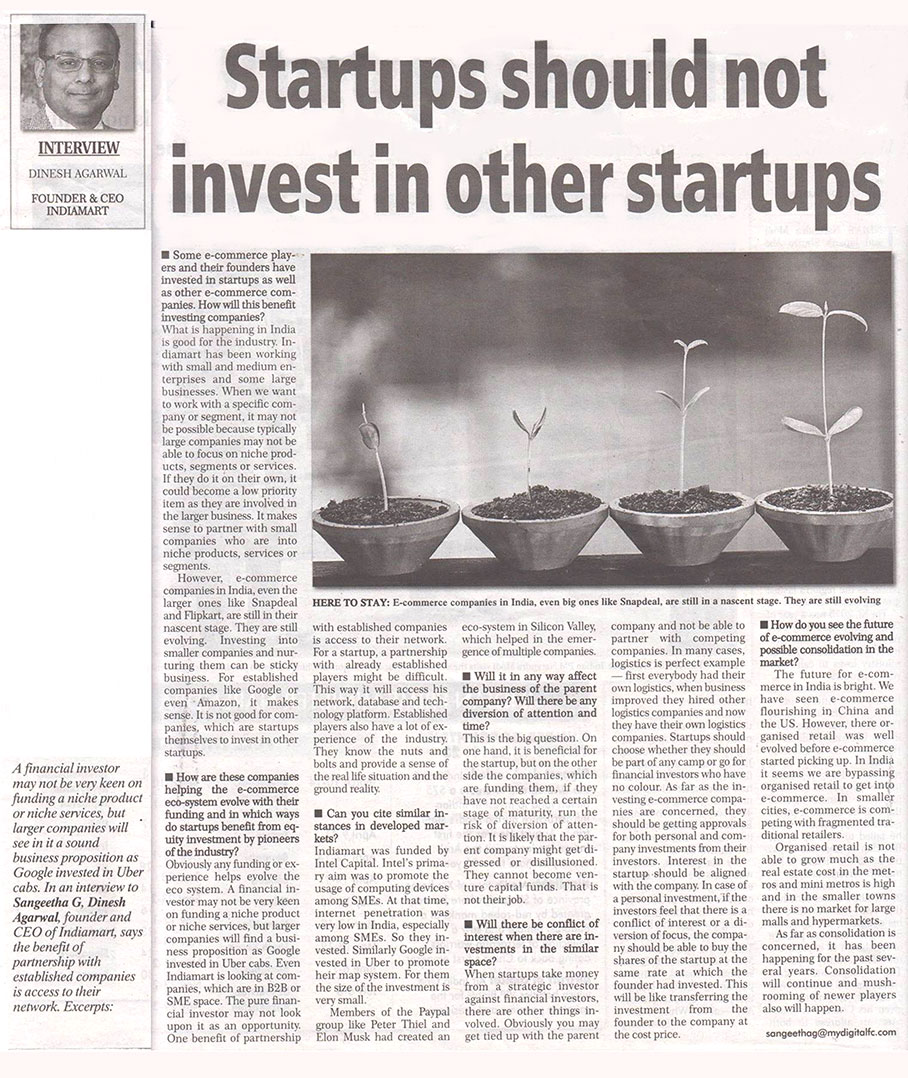
E-commerce companies in India, even big ones like Snapdeal, are still in a nascent stage
A financial investor may not be very keen on funding a niche product or niche services, but larger companies will see in it a sound business proposition as Google invested in Uber cabs. In an interview to Sangeetha G of FC, Dinesh Agarwal, founder and CEO of Indiamart, says the benefit of partnership with established companies is access to their network. Excerpts:
Some e-commerce players and their founders have invested in startups as well as other e-commerce companies. How will this benefit investing companies?
What is happening in India is good for the industry. Indiamart has been working with small and medium enterprises and some large businesses. When we want to work with a specific company or segment, it may not be possible because typically large companies may not be able to focus on niche products, segments or services. If they do it on their own, it could become a low priority item as they are involved in the larger business. It makes sense to partner with small companies who are into niche products, services or segments.
However, e-commerce companies in India, even the larger ones like Snapdeal and Flipkart, are still in their nascent stage. They are still evolving. Investing into smaller companies and nurturing them can be sticky business. For established companies like Google or even Amazon, it makes sense. It is not good for companies, which are startups themselves to invest in other startups.
How are these companies helping the e-commerce eco-system evolve with their funding and in which ways do startups benefit from equity investment by pioneers of the industry?
Obviously any funding or experience helps evolve the eco system. A financial investor may not be very keen on funding a niche product or niche services, but larger companies will find a business proposition as Google invested in Uber cabs. Even Indiamart is looking at companies, which are in B2B or SME space. The pure financial investor may not look upon it as an opportunity. One benefit of partnership with established companies is access to their network. For a startup, a partnership with already established players might be difficult. This way it will access his network, database and technology platform. Established players also have a lot of experience of the industry. They know the nuts and bolts and provide a sense of the real life situation and the ground reality.
Can you cite similar instances in developed markets?
Indiamart was funded by Intel Capital. Intel’s primary aim was to promote the usage of computing devices among SMEs. At that time, internet penetration was very low in India, especially among SMEs. So they invested. Similarly Google invested in Uber to promote heir map system. For them the size of the investment is very small.
Members of the Paypal group like Peter Thiel and Elon Musk had created an eco-system in Silicon Valley, which helped in the emergence of multiple companies.
Will it in any way affect the business of the parent company? Will there be any diversion of attention and time?
This is the big question. On one hand, it is beneficial for the startup, but on the other side the companies, which are funding them, if they have not reached a certain stage of maturity, run the risk of diversion of attention. It is likely that the parent company might get digressed or disillusioned. They cannot become venture capital funds. That is not their job.
Will there be conflict of interest when there are investments in the similar space?
When startups take money from a strategic investor against financial investors, there are other things involved. Obviously you may get tied up with the parent company and not be able to partner with competing companies. In many cases, logistics is perfect example — first everybody had their own logistics, when business improved they hired other logistics companies and now they have their own logistics companies. Startups should choose whether they should be part of any camp or go for financial investors who have no colour. As far as the investing e-commerce companies are concerned, they should be getting approvals for both personal and company investments from their investors. Interest in the startup should be aligned with the company. In case of a personal investment, if the investors feel that there is a conflict of interest or a diversion of focus, the company should be able to buy the shares of the startup at the same rate at which the founder had invested. This will be like transferring the investment from the founder to the company at the cost price.
How do you see the future of e-commerce evolving and possible consolidation in the market?
The future for e-commerce in India is bright. We have seen e-commerce flourishing in China and the US. However, there organised retail was well evolved before e-commerce started picking up. In India it seems we are bypassing organised retail to get into e-commerce. In smaller cities, e-commerce is competing with fragmented traditional retailers.
Organised retail is not able to grow much as the real estate cost in the metros and mini metros is high and in the smaller towns there is no market for large malls and hypermarkets.
As far as consolidation is concerned, it has been happening for the past several years. Consolidation will continue and mushrooming of newer players also will happen.
Read more at http://www.mydigitalfc.com/views/bdinesh-agarwalb-startups-should-not-invest-other-startups-533

